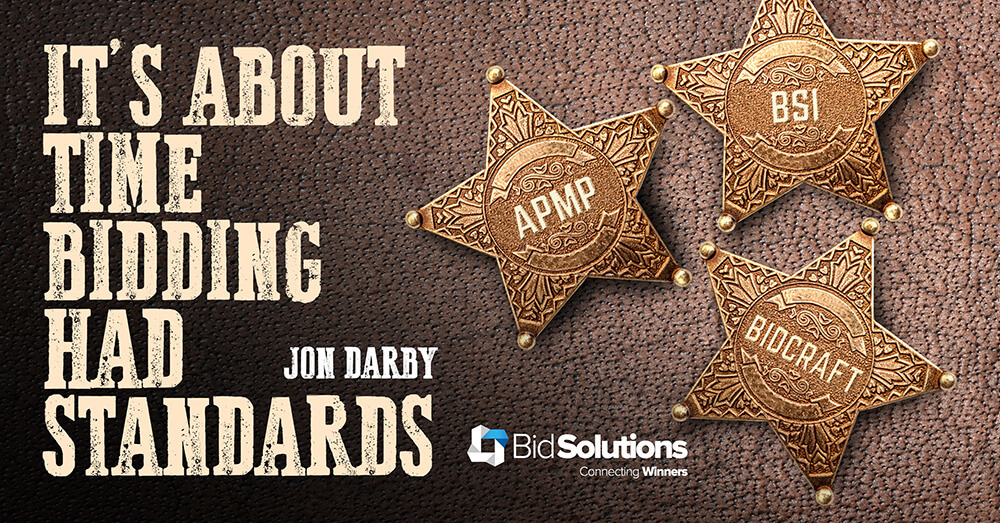
The new consensus-based global standard for the bid and proposal industry will be led by the British Standards Institution (BSI), sponsored by the Association of Proposal Management Professionals (APMP) and authored by BidCraft. The standard will be shaped by diverse stakeholders, making it representative, inclusive, and freely accessible to everyone globally.
Tell us about the standard, how it came about, and why it’s needed
Bidding is big business. Government and industry award contracts worth billions every year through competitive tendering and organisations spend huge sums of money bidding to win these contracts. Yet there are no standards to guide this process, which risks sub-optimal outcomes and inefficiencies.
That’s where the idea for a global industry standard came from. If standards exist for quality assurance the world over, why shouldn’t they exist for bidding?
What is a consensus-based standard?
Opinions vary on how to define ‘best practices’ or ‘good practices’ and the tendency in our industry to look at things from the inside-out, rather than the outside-in, doesn’t help.
I believe we should actively seek different perspectives and question whether existing bidding practices are still relevant in today’s world. Are they practical and attainable? Are they focussed on the right things? Do they address the strategic as well as the mechanical aspects of bidding?
That’s why, as an independent and world-renowned authority, BSI is best placed to lead the impartial development of a trusted consensus-based standard that will be freely accessible to everyone around the world.
The term ‘consensus-based’ is important. The standard won’t be a single company’s proprietary view of bidding practices. It will be shaped by a broad group of diverse stakeholders who have a closely coupled relationship to bidding, including:
- Central government
- Local government
- Associations
- Private companies
- Management consultancies
- Sales organisations
- Charities/Not-for-Profits
- Procurement specialists
- Project management specialists
- Professional bodies
- Academia
Think about this list for a moment. Many Bidding Quarterly readers will be working for, or bidding to win business with, these stakeholders. Meanwhile, these same stakeholders will be helping to develop the industry standard. That strikes me as being a virtuous circle.
Who is BSI and why is the UK leading on this?
BSI is appointed by the UK Government as the national standards body and holds the Royal Charter. It represents UK interests at the International Organization for Standardization (ISO), the International Electrotechnical Commission (IEC) and the European Standards Organizations (CEN, CENELEC and ETSI).
Once a standard is developed by a national standards body like BSI, any of the other 167 national standards bodies around the world (the American National Standards Institute, for example) can adopt it. They don’t develop their own standard if one already exists somewhere in the world. This means the standard starts in the UK under BSI, with the understanding it will be adopted globally. The intention is for it ultimately to then become an ISO standard.
How will organisations be able to adopt the standard and how will it benefit those that do?
Any and every bidding stakeholder (from micro-companies to multi-nationals or grant chasers to government teams) will be able to adopt the standard.
Taking businesses as an example, its adoption could be led by a Head of Bids who wants to improve bidding performance; Business Development owners who want better results; a procurement officer who wants to drive better buying outcomes; or even board-level decision makers such as Partners and CEOs who want to maximise returns on their bidding investment and improve business performance.
There are many benefits for those who adopt the standard, from opportunity-maximisation to risk mitigation. Fundamentally, we see better bidding outcomes for all as a result.
Who is driving the standard’s production?
Many people will be involved in the production of the standard but there are three core parties responsible for making it happen:
- BSI will lead the execution and delivery of the standard’s development.
- APMP will be the standard’s Sponsor. As the global association for our profession, it will fund the standard’s development directly with BSI and promote it as a stakeholder.
- BidCraft will be the volunteer Technical Author, drawing on many years of collective bidding, procurement, and project management experience to write the consensus-based standard with direction from the previously mentioned stakeholder group.
What’s the catch? Why doesn’t this exist already?
We’re not entirely sure ourselves! This will be an industry first and it’s worth noting a standard in any guise is not the same as certification; this new standard will be complementary to APMP certification. We can only presume it doesn’t yet exist because of the sheer resource required (in terms of time, energy, and capital) to produce standards of this kind.
One thing we do know is there’s already been a fantastic response to it within industry and government, from senior leaders who’ve recognised the urgent need for a trusted standard to secure better bidding and procurement outcomes.
How can APMP members and BQ readers get involved?
The standard will be released for public consultation once in a developed state so everyone can view and provide written feedback before its final release for professional use. All feedback from every stakeholder, APMP members included, will be gratefully received and considered.
Where and when will the standard be accessible?
We anticipate the standard being ready for publication and use from summer 2023. It will be freely available for anyone to access and download directly from BSI’s website at www.bsigroup.com. APMP and BidCraft will also share updates and promote the standard once it’s published.
And finally…
I remember the impact the APMP certification programme had when it was launched in 2004. This standard is another major milestone in the proud history of APMP and our profession. It will be transformative and take us all into a bold, confident, and exciting future.
This article was written by Jon Darby.
Jon has 25 years’ bid and capture experience in winning complex public sector tenders in the aerospace, defence, IT services and healthcare markets. This includes leading and managing international teams on deals worth up to £3.5 billion.
Jon received APMP UK’s Industry Innovation Award in 2020. He is committed to advancing the bid and capture profession as a valued career of choice. He has volunteered on the APMP UK board for seven years (including as Chapter Chair). Jon regularly speaks at conferences, live events and webinars.

